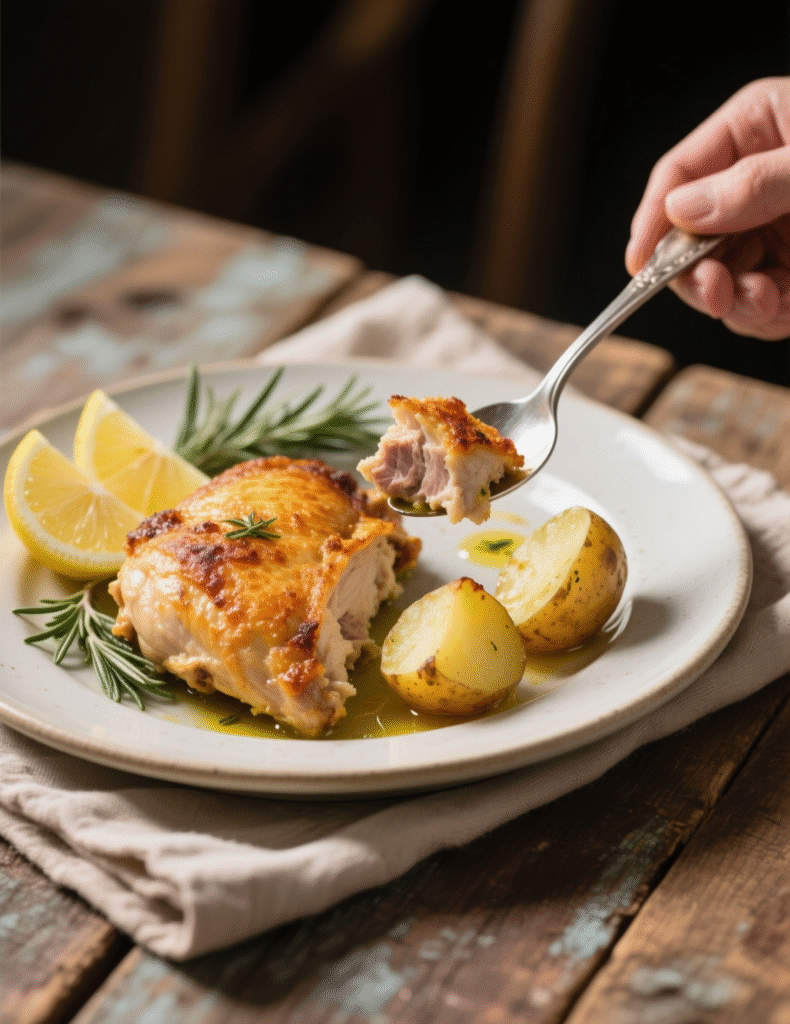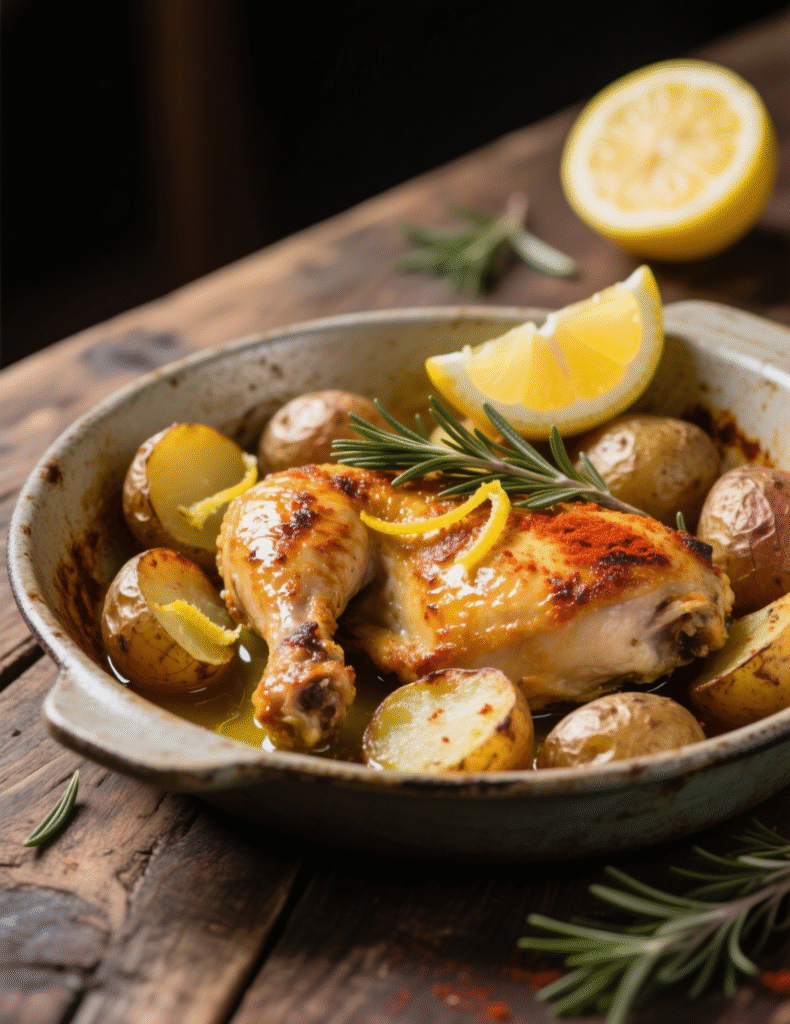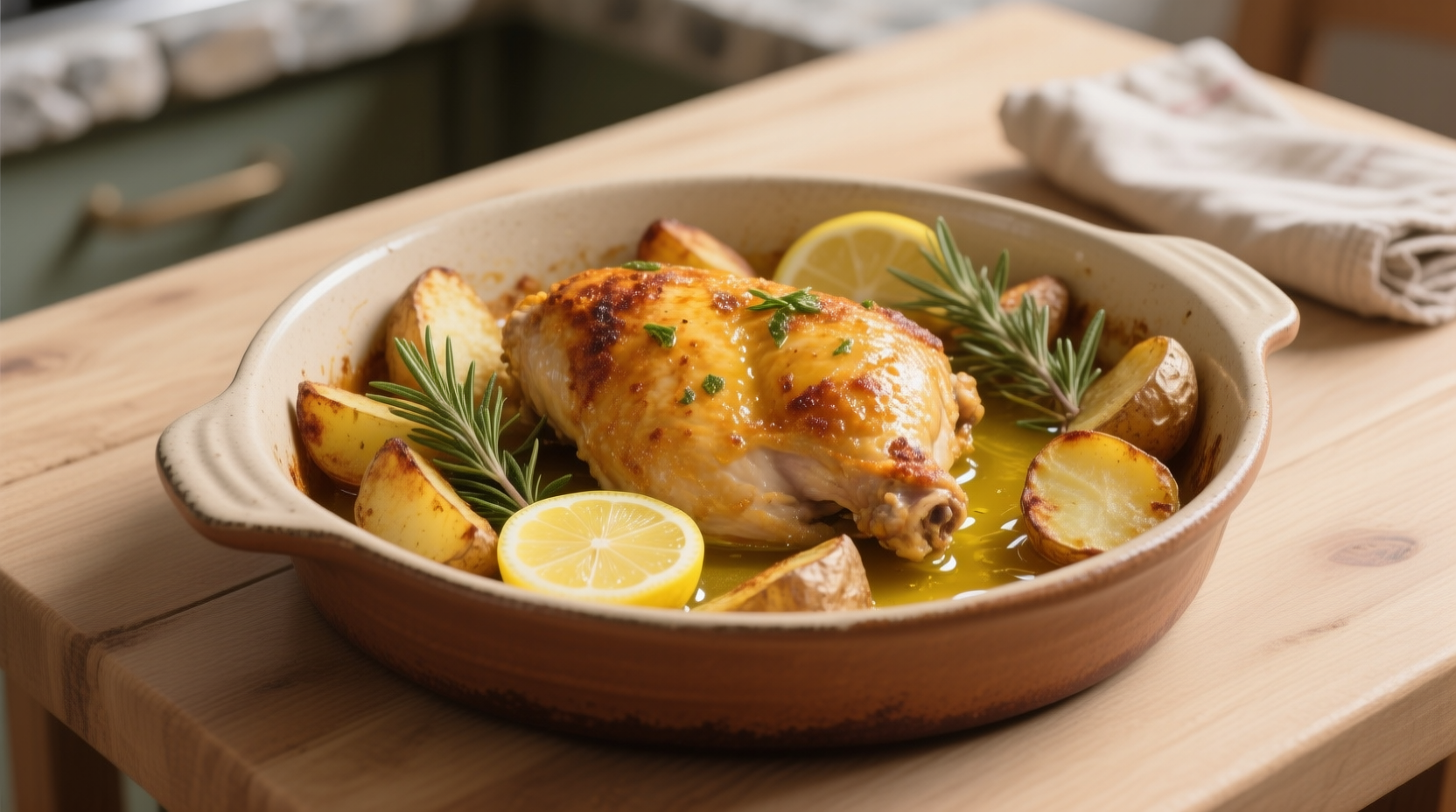There are dishes that feed the stomach, and then there are dishes that linger in the memory long after the table is cleared. Greek Lemon Chicken with Potatoes falls squarely into the second camp. This isn’t just another baked chicken recipe; it’s a lesson in restraint, a study in balance, and a reminder that when the Greeks combine lemon, olive oil, and oregano, magic happens. Professional chefs often chase complexity, but here the sophistication is hidden in simplicity.
Why This Dish Matters in Culinary Practice
In Mediterranean kitchens, roasted chicken and potatoes are more than dinner—they’re a cultural ritual. Greece, in particular, leans on the marriage of acid and fat. Lemon cuts through the richness of chicken skin, olive oil wraps every potato wedge in silk, and herbs tie it all together. For chefs, this dish is a masterclass in how acidity transforms proteins and starches without overpowering them.
The technique looks ordinary on paper. Yet, ask anyone who’s tried a mediocre version, and they’ll tell you something’s missing. That “something” is usually the balance of seasoning, timing of lemon application, or the type of potato. Professional execution here separates a homey plate from an unforgettable one.
Ingredients with Professional Insights
The base recipe appears deceptively simple: chicken, potatoes, lemon, olive oil, garlic, oregano, and stock. But professionals know the devil hides in the details.
- Chicken: Whole chicken cut into parts retains more flavor than boneless skinless cuts. The skin protects moisture, the bones release gelatin, and the dark meat handles roasting temperatures better.
- Potatoes: Waxy potatoes like Yukon Gold hold structure during roasting, while starchy Russets soak up juices like sponges. A blend creates contrast—soft insides with crisp golden edges.
- Lemon: Always use fresh lemon juice. Bottled lemon juice tastes flat because it lacks the volatile aromatic oils found in zest and fresh juice. In fact, zesting half a lemon into the marinade deepens brightness dramatically.
- Olive Oil: Use extra-virgin. Even though some chefs worry about its smoke point, the oven temperature is not high enough to degrade quality oil significantly. The flavor here is essential.
- Oregano: Greek oregano has sharper notes than Turkish or Mexican. Dried oregano is more traditional than fresh in this dish because drying intensifies the herb’s essential oils.
The Science of Flavor Balance
Cooks often underestimate acidity in meat preparation. Lemon juice doesn’t just flavor—it alters proteins. The citric acid denatures surface proteins, tenderizing slightly while allowing deeper absorption of seasoning. Yet too much lemon, added too early, risks turning chicken texture mushy. The professional trick is balance: marinate lightly for 30–45 minutes, then baste with fresh lemon juice toward the end of cooking.
Potatoes behave differently under the same influence. Acidity slows their breakdown, which is why you won’t see them collapsing into mush in this dish. Instead, they hold structure while absorbing the chicken’s juices. This explains why Greek potatoes baked under chicken taste richer than standalone roasted potatoes.

Technique: Building Layers of Flavor
Roasting is straightforward, but professionals think in layers.
- Marination: Mix olive oil, lemon juice, garlic, oregano, and salt. Coat chicken pieces, let them sit just long enough to take on flavor without breaking texture.
- Pan Preparation: Place potato wedges at the bottom of a roasting pan. Season them generously—underdone potatoes ruin the harmony.
- Chicken Placement: Arrange chicken on top. As fat renders, potatoes below soak in juices, acting almost like a self-basting mechanism.
- Stock Addition: Pour a light chicken stock or water around the potatoes. This ensures steam cooks them through before crisping occurs.
- Roasting Stages: Start at a high heat to crisp skin, then lower temperature to gently finish. Near the end, another squeeze of lemon wakes everything up.
These stages sound ordinary but executed correctly, they transform the dish.
Regional Variations Worth Knowing
Greek households rarely follow the exact same recipe. Northern Greece often includes bay leaves, while island versions may sneak in cinnamon sticks or allspice for warmth. Some cooks use mustard whisked into the marinade, adding body and tang. Professional chefs experimenting with authenticity can borrow these variations but should keep restraint—too many additions mask the simplicity that makes the dish special.
Common Mistakes Professionals Avoid
Even seasoned cooks slip here. The most frequent mistakes:
- Overcrowding the pan. Steam builds up, chicken skin softens instead of crisping. Use wide roasting pans, not deep casserole dishes.
- Skipping seasoning at multiple stages. Potatoes and chicken need seasoning separately, not just one blanket seasoning at the end.
- Adding lemon only once. Early lemon provides depth, but late lemon provides freshness. You need both.
- Not rotating pieces. Ovens have hot spots. Moving potatoes and chicken ensures even browning.
Each misstep weakens the final plate. Professionals who know these pitfalls consistently deliver more balanced results.
Nutrition and Modern Dietary Trends
Mediterranean diets remain among the most studied and praised for cardiovascular benefits. Harvard research notes diets rich in olive oil and vegetables reduce risks of heart disease by 30%. Greek Lemon Chicken with Potatoes fits perfectly within this context. The dish avoids heavy creams or processed fats, relying instead on natural ingredients.
For chefs catering to modern diners, this makes the dish marketable. It aligns with clean eating, gluten-free requirements, and the “real food” movement. Portion adjustments, such as smaller thighs or boneless breasts, can adapt it to calorie-conscious menus without diluting flavor integrity.
Professional Pairings
A dish like this rarely stands alone. In Greek homes, it appears with a crisp salad, often tomatoes, cucumber, onion, feta, and olives. The acidity of vinegar and feta amplifies the chicken’s brightness. For professionals in menu development, consider these pairings:
- Wine: Assyrtiko, a Greek white, mirrors lemon’s acidity while cutting through fat. Alternatively, a Sauvignon Blanc works in Western restaurants.
- Bread: Rustic sourdough or pita soaks up pan juices—wasting them borders on culinary crime.
- Side Dish: Roasted green beans or zucchini, lightly charred, echo the earthy flavors of oregano.
Pairings extend the dish from rustic comfort food to a refined dining experience.

The Role of Technique in Restaurant Execution
In restaurant settings, scale becomes the challenge. A single pan at home roasts beautifully. Ten pans in a professional oven risk uneven cooking. Some chefs par-cook potatoes separately, then finish them under the chicken to guarantee tenderness. Others confit chicken thighs in olive oil at low temperature, then roast at high heat with potatoes to ensure consistency.
Another challenge: holding time. Roasted potatoes lose crispness fast in a steam table. The workaround is double-roasting—cook until tender, hold warm, then re-crisp under high heat before service. Professionals planning banquets or catering should rely on this technique.
Cultural Importance and Emotional Connection
Greeks consider food an extension of hospitality. Serving lemon chicken and potatoes at a family gathering isn’t just about taste—it signals warmth, generosity, and tradition. For professional chefs, respecting this cultural layer matters. Diners increasingly seek authenticity. A dish cooked with understanding of its roots resonates more deeply than one replicated without context.
Modern Interpretations
Contemporary chefs riff on classics while honoring their spirit. Some replace potatoes with sweet potatoes for color contrast. Others deconstruct the dish: sous-vide chicken thighs finished under a salamander, lemon potato purée on the side, oregano oil drizzled over. Done right, these updates respect tradition while pushing creativity. Done wrong, they strip the soul out. The key is always balance.
Key Takeaways for Professionals
Greek Lemon Chicken with Potatoes teaches lessons beyond its ingredient list. It proves restraint can be more powerful than excess. It demonstrates how acid, fat, and herb interplay defines balance. And it shows that cultural roots give dishes staying power in kitchens around the world.
Professionals who approach this dish with care will not only master a classic but also learn broader principles: layering flavors, respecting ingredient integrity, and timing seasoning for maximum effect.
Conclusion
Greek Lemon Chicken with Potatoes is not just another Mediterranean recipe—it’s an archetype of harmony. Every squeeze of lemon, every drizzle of oil, every herb sprinkled is deliberate. Professionals who respect its balance elevate not just chicken and potatoes, but their entire understanding of how simple ingredients achieve greatness.
This dish reminds us: complexity isn’t always in the number of steps. Sometimes, it hides in the restraint to stop when the flavors are already perfect. And in the world of cooking, that restraint is often the hardest skill to master.
FAQs
What makes Greek Lemon Chicken and Potatoes unique?
The balance of lemon, olive oil, and oregano creates bright yet comforting flavors that define Greek cooking.
Can I use boneless chicken for this recipe?
Yes, but bone-in cuts keep more moisture and deliver richer flavor during roasting.
Which potatoes are best for this dish?
Yukon Golds hold their shape, while Russets soak up juices—many chefs blend both.
Why add lemon twice in the cooking process?
Early lemon tenderizes and seasons, while a fresh squeeze at the end adds brightness.
Should I marinate the chicken overnight?
No, 30–45 minutes is enough—longer can make the meat texture mushy.
Can I replace oregano with another herb?
You can, but Greek oregano is traditional and provides the signature flavor.
What wine pairs best with this dish?
Assyrtiko, a crisp Greek white, complements the lemon and olive oil beautifully.
How do I keep potatoes crispy for service?
Use a double-roast method: cook until tender, then re-crisp under high heat.
Is this recipe healthy?
Yes, it fits the Mediterranean diet, using olive oil and fresh ingredients without heavy fats.
Can I prepare this dish for large gatherings?
Yes, but scale carefully—use wide roasting pans and avoid overcrowding.

Mariana is a passionate home cook who creates delicious, easy-to-follow recipes for busy people. From energizing breakfasts to satisfying dinners and indulgent desserts, her dishes are designed to fuel both your body and hustle.
When she’s not in the kitchen, she’s exploring new flavors and dreaming up her next recipe to share with the Foodie Hustle community.

